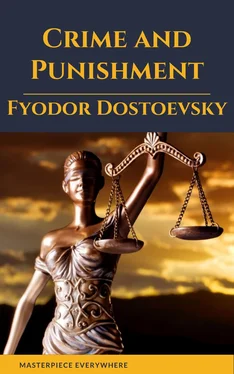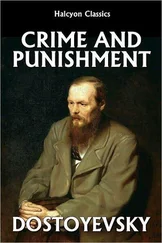"Why are you lying like a log?" she shouted, looking at him with repulsion.
He got up, and sat down again, but said nothing and stared at the floor.
"Are you ill or not?" asked Nastasya and again received no answer. "You'd better go out and get a breath of air," she said after a pause. "Will you eat it or not?"
"Afterwards," he said weakly. "You can go."
And he motioned her out.
She remained a little longer, looked at him with compassion and went out.
A few minutes afterwards, he raised his eyes and looked for a long while at the tea and the soup. Then he took the bread, took up a spoon and began to eat.
He ate a little, three or four spoonfuls, without appetite, as it were mechanically. His head ached less. After his meal he stretched himself on the sofa again, but now he could not sleep; he lay without stirring, with his face in the pillow. He was haunted by day-dreams and such strange day-dreams; in one, that kept recurring, he fancied that he was in Africa, in Egypt, in some sort of oasis. The caravan was resting, the camels were peacefully lying down; the palms stood all around in a complete circle; all the party were at dinner. But he was drinking water from a spring which flowed gurgling close by. And it was so cool, it was wonderful, wonderful, blue, cold water running among the parti-coloured stones and over the clean sand which glistened here and there like gold… . Suddenly he heard a clock strike. He started, roused himself, raised his head, looked out of the window, and seeing how late it was, suddenly jumped up wide awake as though someone had pulled him off the sofa. He crept on tiptoe to the door, stealthily opened it and began listening on the staircase. His heart beat terribly. But all was quiet on the stairs as if everyone was asleep… . It seemed to him strange and monstrous that he could have slept in such forgetfulness from the previous day and had done nothing, had prepared nothing yet… . And meanwhile perhaps it had struck six. And his drowsiness and stupefaction were followed by an extraordinary, feverish, as it were distracted haste. But the preparations to be made were few. He concentrated all his energies on thinking of everything and forgetting nothing; and his heart kept beating and thumping so that he could hardly breathe. First he had to make a noose and sew it into his overcoat—a work of a moment. He rummaged under his pillow and picked out amongst the linen stuffed away under it, a worn out, old unwashed shirt. From its rags he tore a long strip, a couple of inches wide and about sixteen inches long. He folded this strip in two, took off his wide, strong summer overcoat of some stout cotton material (his only outer garment) and began sewing the two ends of the rag on the inside, under the left armhole. His hands shook as he sewed, but he did it successfully so that nothing showed outside when he put the coat on again. The needle and thread he had got ready long before and they lay on his table in a piece of paper. As for the noose, it was a very ingenious device of his own; the noose was intended for the axe. It was impossible for him to carry the axe through the street in his hands. And if hidden under his coat he would still have had to support it with his hand, which would have been noticeable. Now he had only to put the head of the axe in the noose, and it would hang quietly under his arm on the inside. Putting his hand in his coat pocket, he could hold the end of the handle all the way, so that it did not swing; and as the coat was very full, a regular sack in fact, it could not be seen from outside that he was holding something with the hand that was in the pocket. This noose, too, he had designed a fortnight before.
When he had finished with this, he thrust his hand into a little opening between his sofa and the floor, fumbled in the left corner and drew out the pledge, which he had got ready long before and hidden there. This pledge was, however, only a smoothly planed piece of wood the size and thickness of a silver cigarette case. He picked up this piece of wood in one of his wanderings in a courtyard where there was some sort of a workshop. Afterwards he had added to the wood a thin smooth piece of iron, which he had also picked up at the same time in the street. Putting the iron which was a little the smaller on the piece of wood, he fastened them very firmly, crossing and re-crossing the thread round them; then wrapped them carefully and daintily in clean white paper and tied up the parcel so that it would be very difficult to untie it. This was in order to divert the attention of the old woman for a time, while she was trying to undo the knot, and so to gain a moment. The iron strip was added to give weight, so that the woman might not guess the first minute that the "thing" was made of wood. All this had been stored by him beforehand under the sofa. He had only just got the pledge out when he heard someone suddenly about in the yard.
"It struck six long ago."
"Long ago! My God!"
He rushed to the door, listened, caught up his hat and began to descend his thirteen steps cautiously, noiselessly, like a cat. He had still the most important thing to do—to steal the axe from the kitchen. That the deed must be done with an axe he had decided long ago. He had also a pocket pruning-knife, but he could not rely on the knife and still less on his own strength, and so resolved finally on the axe. We may note in passing, one peculiarity in regard to all the final resolutions taken by him in the matter; they had one strange characteristic: the more final they were, the more hideous and the more absurd they at once became in his eyes. In spite of all his agonising inward struggle, he never for a single instant all that time could believe in the carrying out of his plans.
And, indeed, if it had ever happened that everything to the least point could have been considered and finally settled, and no uncertainty of any kind had remained, he would, it seems, have renounced it all as something absurd, monstrous and impossible. But a whole mass of unsettled points and uncertainties remained. As for getting the axe, that trifling business cost him no anxiety, for nothing could be easier. Nastasya was continually out of the house, especially in the evenings; she would run in to the neighbours or to a shop, and always left the door ajar. It was the one thing the landlady was always scolding her about. And so, when the time came, he would only have to go quietly into the kitchen and to take the axe, and an hour later (when everything was over) go in and put it back again. But these were doubtful points. Supposing he returned an hour later to put it back, and Nastasya had come back and was on the spot. He would of course have to go by and wait till she went out again. But supposing she were in the meantime to miss the axe, look for it, make an outcry —that would mean suspicion or at least grounds for suspicion.
But those were all trifles which he had not even begun to consider, and indeed he had no time. He was thinking of the chief point, and put off trifling details, until he could believe in it all. But that seemed utterly unattainable. So it seemed to himself at least. He could not imagine, for instance, that he would sometime leave off thinking, get up and simply go there… . Even his late experiment (i.e. his visit with the object of a final survey of the place) was simply an attempt at an experiment, far from being the real thing, as though one should say "come, let us go and try it—why dream about it!"—and at once he had broken down and had run away cursing, in a frenzy with himself. Meanwhile it would seem, as regards the moral question, that his analysis was complete; his casuistry had become keen as a razor, and he could not find rational objections in himself. But in the last resort he simply ceased to believe in himself, and doggedly, slavishly sought arguments in all directions, fumbling for them, as though someone were forcing and drawing him to it.
Читать дальше












